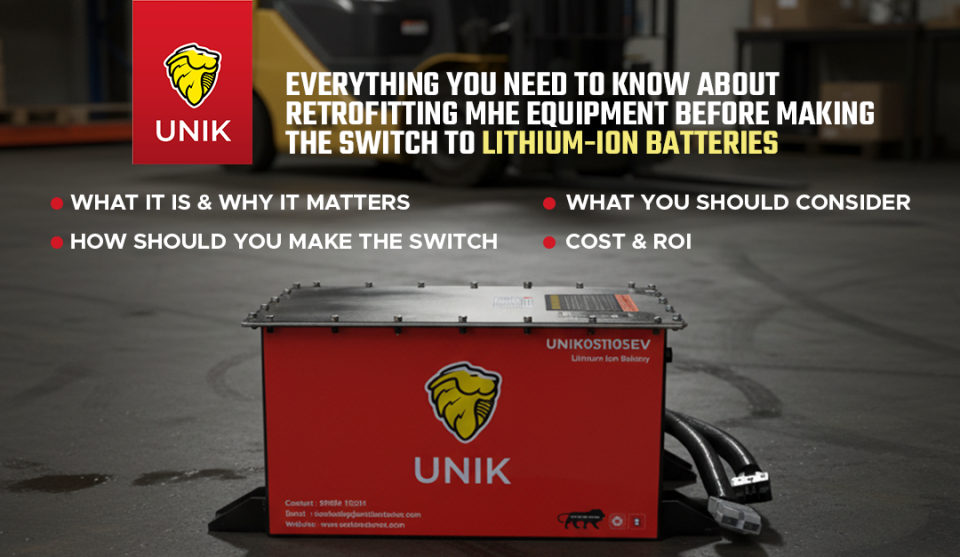The Advantages of Lithium-Ion Batteries in Industrial Applications
In the fast-paced world of industrial applications, efficient and reliable power solutions are crucial. Lithium-ion batteries have emerged as a game-changer as industries strive for more sustainable and high-performance energy sources. This blog explores lithium-ion technology’s remarkable advantages and growing applications in the industrial sector.
The Rise of Lithium-ion Batteries in Industrial Power Applications
Lithium-ion cell technology
has revolutionised the energy storage landscape with superior technology and performance. Unlike traditional batteries, they offer several benefits that make them ideal for industrial settings.
Key Advantages of Lithium-ion Batteries
High Efficiency
One of the standout features of lithium-ion batteries is their high energy density. This means they can store more energy in a smaller space, making them incredibly efficient. For industries, this translates to longer operating times and fewer interruptions, enhancing productivity and reducing downtime.
Longer Lifespan.
Lithium batteries are known for their longevity. They can withstand much higher charge and discharge cycles in comparison to lead acid batteries, significantly reducing the need for frequent replacements. This durability is especially advantageous for industrial applications where equipment uptime is critical.
Fast Charging Capabilities
Time is money in industrial operations. Lithium-ion batteries can be charged at a much faster rate compared to other battery types. This rapid charging capability ensures that industrial equipment can be quickly returned to service, maximizing operational efficiency.
Low Maintenance
Lithium-ion technology requires minimal maintenance when compared to lead acid batteries. They do not suffer from memory effects, and their self-discharge rate is low. This means it can retain their charge for extended periods when not in use, providing reliable backup power solutions.
Lightweight and Compact
Lithium-ion batteries are compact and lightweight, making them ideal for use in various industrial equipment. This simplifies the design and integration process and contributes to the equipment's efficiency and portability.
Applications of Lithium-Ion Batteries
The versatility of lithium-ion technology has led to their adoption in numerous industrial applications:
Material Handling Equipment
Forklifts, pallet trucks, and other material handling equipment benefit greatly from the efficiency and reliability of lithium batteries. These batteries provide consistent power output, essential for demanding tasks in warehouses and manufacturing plants.
Uninterruptible Power Supplies (UPS)
In critical industrial environments, maintaining a continuous power supply is vital. These batteries are increasingly used in UPS systems to ensure that essential operations remain unaffected by power outages.
Automated Guided Vehicles
AGVs are becoming more prevalent in the logistics and manufacturing industries. Lithium-ion batteries provide these vehicles with a reliable and long-lasting power source, enabling them to operate efficiently over extended periods.
Renewable Energy Storage
As industries move towards sustainable energy solutions, lithium-ion technology is crucial in storing energy from renewable sources like solar and wind. This stored energy can power industrial operations, reducing reliance on conventional power sources.
Conclusion
The adoption of lithium-ion batteries in industrial settings is expected to grow exponentially. Their advantages of high energy density, longer lifespan, fast charging, low maintenance, and lightweight design make them ideal choices for various applications. As technology advances, lithium-ion solutions will likely become even more integral to industrial power solutions. Their superior performance characteristics and versatile applications make them essential to modern industrial operations. As industries grow Lithium-ion technology will undoubtedly play a pivotal role in shaping the future of industrial energy storage as industries continue to seek efficient and sustainable power solutions.
By understanding and leveraging the benefits of these batteries, industries can achieve greater efficiency, sustainability, and reliability in their operations. Enhance your industrial power solutions with UNIK’s state-of-the-art lithium-ion batteries.
Contact us today to learn more about the numerous benefits and applications of our lithium-ion solutions.






